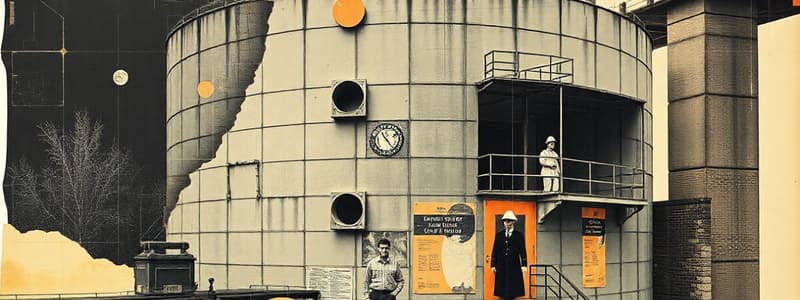Podcast
Questions and Answers
What should be the approach to analyze shear forces in the design of circular tanks?
What should be the approach to analyze shear forces in the design of circular tanks?
- Analyze shear distribution only at the base of the tank.
- Analyze shear distribution in both the tank walls and base. (correct)
- Ignore shear distribution in the tank walls for simplicity.
- Assume uniform shear distribution throughout the tank.
Which parameter is NOT considered in the calculation of the factored load for circular tanks?
Which parameter is NOT considered in the calculation of the factored load for circular tanks?
- Live load
- Dead load
- Wind load (correct)
- Snow load
During the design for shear strength, what must be checked against applied shear forces?
During the design for shear strength, what must be checked against applied shear forces?
- The reinforcement area only.
- The bending moments.
- The moment capacity.
- The shear capacity. (correct)
What is a key difference between the working stress method and the limit state method in tank design?
What is a key difference between the working stress method and the limit state method in tank design?
How should deflections and crack widths be handled during design?
How should deflections and crack widths be handled during design?
Which of the following does not form part of the design checks for concrete reinforcement according to IS 456?
Which of the following does not form part of the design checks for concrete reinforcement according to IS 456?
When designing a flexible base tank, what assumption is made regarding the base under load?
When designing a flexible base tank, what assumption is made regarding the base under load?
What should be included in the quality control aspects during construction of circular tanks?
What should be included in the quality control aspects during construction of circular tanks?
In the context of calculating hydrostatic pressure in circular tanks, which formula is used?
In the context of calculating hydrostatic pressure in circular tanks, which formula is used?
What aspect is emphasized by both the working stress method and the limit state method in circular tank design?
What aspect is emphasized by both the working stress method and the limit state method in circular tank design?
Flashcards are hidden until you start studying
Study Notes
Design of Circular Tanks
- Two main methods are used to design circular tanks: Working Stress Method and Limit State Method
- Site Investigation is crucial for both methods and includes determining soil properties like bearing capacity
- Tank Geometry includes diameter, height and capacity
Working Stress Method
- The Working Stress Method assumes the base acts as a rigid plate
- Load considerations include hydrostatic pressure, dead load, and live load
- Hydrostatic pressure is calculated using the formula P = γ * h (γ = unit weight of liquid, h = height of liquid)
- Design Steps involve calculating bending moments, shear forces in the tank walls and base, and selecting concrete grades as per IS 456
- Stress analysis ensures stresses are within allowable limits and reinforcement is designed based on moment and shear calculations
- Serviceability check: ensures deflections are within acceptable limits
Limit State Method
- The Limit State Method is considered more comprehensive than the Working Stress Method
- Load Combinations are used as per IS 3370-2021
- Ultimate Limit State (ULS) Analysis calculates maximum bending moments and shear forces at ULS
- Ultimate Load Calculation is based on factored loads: Factored Load = 1.5 × Dead Load + 1.5 × Live Load
- Bending Moment and Shear Force Analysis use structural analysis techniques
- Design For Flexural Strength involves calculating the required depth of the section and reinforcement area
- Design for Shear Strength compares shear capacity to applied shear forces
- Serviceability Limit State Check ensures deflections and crack widths are within permissible limits
General Considerations
- Reinforcement Detailing follows guidelines from IS codes
- Quality Control is essential during construction to ensure compliance with standards
- Regular Maintenance includes inspection and maintenance for long-term integrity
Studying That Suits You
Use AI to generate personalized quizzes and flashcards to suit your learning preferences.




